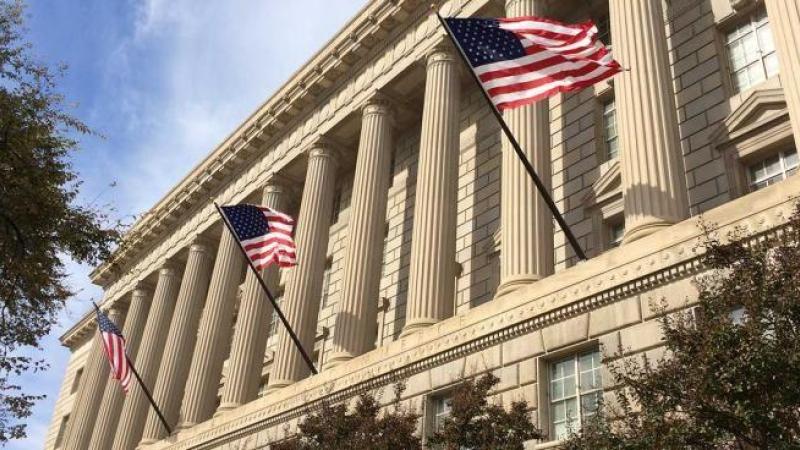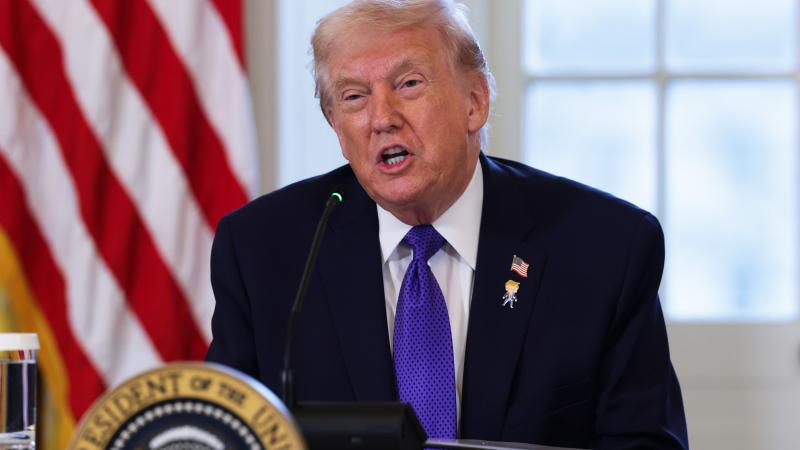House Dems blast Iran for terrorism, human rights record as Biden pushes to revive nuke deal
Biden granting sanctions relief to regime in bid to save nuclear accord, which experts warn would embolden Tehran to continue malign behavior.
More than 50 members of Congress, including several Democrats, on Friday voiced their support for the establishment of a democracy in Iran as they lambasted the Iranian regime for sponsoring terrorism abroad and abusing human rights at home.
The bipartisan call to hold Tehran accountable came a week after President Biden lifted sanctions on the regime amid his push to revive the 2015 nuclear deal — an agreement that would provide Iran with a windfall of funds in exchange for the Iranian government agreeing to temporary curbs on its nuclear program.
Former President Trump withdrew from the accord in 2018.
In an event organized by the Organization of Iranian American Communities, dozens of House members declared their support for a "democratic, secular, and nonnuclear republic of Iran," decrying the "heinous" actions of the Islamist regime in power in Tehran.
Friday's event occurred on the anniversary of the 1979 Iranian revolution, when the monarch of Iran, Mohammad Reza Shah Pahlavi, was overthrown. Ayatollah Ruhollah Khomeini then seized control of the popular revolution and engineered the formation of the Islamic Republic, which he ruled as its first supreme leader until his death in 1989. He was succeeded by Ayatollah Ali Khamenei, who still serves as the supreme leader of Iran.
Dozens of lawmakers marked the anniversary by castigating the regime as cruel and tyrannical and praising the Iranian people for demanding democratic change inside Iran. Since December 2017, there have been eight major nationwide uprisings against the regime along with several sporadic protests in between, according to the OIAC and other Iranian opposition groups.
"I stand with you in strong opposition to the Iranian government's promotion of terrorist activities and its violation of human rights," said Rep. Zoe Lofgren (D-Calif.). "It's important for Congress to acknowledge that these rights violations are unacceptable and that the continual crackdown of peaceful protests in Iran must end. Together, we must promote peace and democracy."
The majority of lawmakers who spoke were Republicans, but several were Democrats who echoed Lofgren's message.
Rep. Brad Schneider (D-Ill.), for example, pledged to hold Iran accountable for its "reprehensible human rights abuses and intolerance of political opposition."
Rep. Scott Peters (D-Calif.) condemned the "heinous acts" of the regime, adding that abuse and torture are "common occurrences as security forces attempt to silence those speaking out" for freedom and democracy.
"For 40 years, the Iranian regime has suppressed its people and exported its brand of fundamentalism and terrorism at every opportunity," said Rep. Tony Cardenas (D-Calif.).
"Standing up for the human rights of the people of Iran is necessary," added Rep. Raul Ruiz (D-Calif.). "The majority of Congress condemns Iran's malignant behavior in the [Middle East]."
Rep. Brad Sherman (D-Calif.) rebuked Iran's "autocratic and corrupt regime that targets its own people," noting Iran is the world's foremost state sponsor of terrorism and is responsible for terrorist attacks around the world, not just in the Middle East.
Many prominent Democrats, such as Rep. Sheila Jackson Lee (D-Texas), touted their support for House Resolution 118, which expresses support for the Iranian people opposing the regime and condemns state-sponsored terrorism by Iran.
Despite such strong rhetoric, however, Democrats have overwhelmingly supported reviving the Iran nuclear deal, which would provide large-scale sanctions relief to the same regime they were condemning.
Several Democrats, including some who spoke at Friday's event, previously signed a letter urging Biden to reenter the agreement. The Democratic Party's 2020 platform similarly praised the nuclear deal and said it's crucial to bring back. Since the 2020 presidential campaign, Biden has made reviving the nuclear deal one of his top priorities.
Some experts have argued the deal emboldened the regime after it was first struck in 2015 and would do the same if revived now. In the time between the signing of the deal and Trump exiting it, the regime used the influx of billions of dollars in sanctions relief to increase its military budget and provide billions of dollars to terrorist groups and its other proxies and allies across the Middle East — most notably to helping the Assad regime in Syria.
Meanwhile, millions of Iranians were living below the poverty line. A common rallying cry among Iranian protests in recent years has been "No to Gaza, no to Lebanon; I sacrifice my life for Iran," an apparent criticism of the regime for prioritizing its expansionist foreign policy over the well-being of the Iranian people.
Iran provides weapons and funding to Hamas in Gaza and Hezbollah in Lebanon. Both groups are U.S.-designated terrorist organizations.
Amid frequent anti-regime protests, the Biden administration has been less vocal in support of the Iranian people than the former Trump administration, despite Democrats in Congress speaking out in support of Iranians on Friday.
"In Iran, Biden turns a deaf ear to tens of thousands of those who protest their regime's incompetence and murder," Michael Rubin, a senior fellow at the American Enterprise Institute, told Just the News.
According to a survey conducted by the Group for Analyzing and Measuring Attitudes in Iran (GAMAAN) in September, only 7% of Iranians said Biden was the American president whose foreign policy "has most benefited the Iranian people." Some 29% chose Trump, while 49% said neither benefited the Iranian people.
Last month, Biden came under scrutiny when he spoke about Americans being held hostage overseas but didn't mention those currently detained in Iran. The president's comments came after two former Iran hostages held a hunger strike at the venue of the talks to revive the nuclear deal. One of those former hostages, U.S. citizen Barry Rosen, recently penned an op-ed in the Washington Post calling on the Biden administration to make freeing Iran's American hostages a higher priority.
One week before Friday's event, the Biden administration granted sanctions relief to Iran, signing waivers related to Iran's civilian nuclear activities. The move was meant to entice Iran to return to compliance with the nuclear deal.
"The waiver with respect to these activities is designed to facilitate discussions that would help to close a deal on a mutual return to full implementation of the [nuclear deal] and lay the groundwork for Iran's return to performance of its [nuclear deal] commitments," the State Department said in a notice to Congress obtained by the Associated Press.
"It is also designed to serve U.S. nonproliferation and nuclear safety interests and constrain Iran's nuclear activities," the notice added, arguing the move wasn't a "quid pro quo."
Over the summer, Biden also provided sanctions relief to Iran as a unilateral action for which it appears to have received nothing in return.
In June, the administration authorized certain transactions involving the Central Bank of Iran or the National Iranian Oil Company. Both entities, which the U.S. has sanctioned for financing Iranian-backed terrorism, are crucial to the economic health of the regime, according to analysts.
The week before, the Treasury Department repealed economic penalties on several former Iranian officials and energy companies.
Both moves came amid reports that Biden's team was looking for ways to inject momentum into stalled nuclear negotiations between the U.S. and Iran.
Four months earlier, Biden said the U.S. wouldn't lift sanctions on Iran to jumpstart negotiations. He added his administration would only provide the Iranian regime such economic relief if it stopped enriching uranium beyond the limit of 3.67% purity set by the deal. Iran is currently enriching uranium at 60% purity, just shy of weapons-grade level needed for a nuclear bomb.
The administration now believes it has until the end of February to salvage the nuclear agreement, with U.S. officials saying the regime has enough fissile material to build a nuclear weapon within weeks if it wants.
Retired Army Lt. General Keith Kellogg, who served as National Security Council chief of staff under President Trump, told Just the News this week that Iran is just using negotiations to buy time to build a nuclear weapon.
"They're waltzing their way toward a nuclear weapon," he said. "There's going to be a nuclear breakout."















